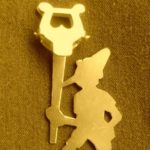Good keys for non-sloppy playing
- This topic has 3 replies, 3 voices, and was last updated 6 years, 11 months ago by
Randy Freemire.
-
AuthorPosts
-
April 20, 2017 at 2:32 pm #8830
Randy Freemire
ParticipantBeing a piano player I’m used to full sized keys, so the mini-keys on my Hohner Instructor 32 are pretty small. But beyond how small the keys are, they feel “sloppy”. I’ve played all kinds of full-sized keys, and even being full sized, some keys make me a sloppy player, and some give me the right kind of resistance that my playing is clear and articulate.
So the question is: which melodicas have good feeling keys? Being that most melodicas have the mini keys I guess I’ll have to live with that, but I’m sure some melodicas have better keys than others. Where it gets the bad with the Instructor 32 is playing the black keys, which might also be the angle from which I’m playing.
Thanks!
RandyApril 25, 2017 at 1:49 pm #8841 Shannon MParticipant
Shannon MParticipantHi, Randy
None of the melodicas that I have played (about 15 different ones) are weighted or have the resistance that piano keys do. The best I have played is the Hohner Professional, whose keys are also larger. The Yamaha 37 has the smaller keys, but does have pretty good “feel”. Also, the Clavietta has adjustable spring tension, so that may help you as well.
Just some thoughts
Regards,
Shannon
April 26, 2017 at 5:31 pm #8844 Alan BrintonParticipant
Alan BrintonParticipantAdjusting spring tension is a good suggestion. Increasing tension will make key action more stable, though there can also be a down side to this. Spring tension is adjustable on most if not all melodicas, Randy, even without adjustment screws. Most common are extension springs, whose tension can be increased by cutting off a loop and be decreased by stretching. The tension of compression springs can be increased by stretching the spring slightly (careful not to overdo it) and be decreased by cutting off a loop. Torsion springs are under the keys and can be bent in or out, “closed” or “opened.” If there are not adjustment screws, the spring has to be removed, adjusted, and then replaced. This is easy to do in most cases with extension springs, once you get the knack of it. It is a bit trickier with compression springs (which you don’t want to be launched off into the atmosphere), and harder with torsion springs, which are sometimes hard to get back into position. The main things to remember are not to overdo it and not to twist the spring out of shape.
May 9, 2017 at 3:36 pm #8872Randy Freemire
ParticipantShannon and Alan,
Thank you for the information, very helpful! I suspect that much of the problem is that the Hohner Instructor 32 is a pretty cheap instrument and that stepping up to something better will go a long ways.I notice the Hohner Professional 32 is no longer available. For my next melodica I was planning on buying the Yamaha 32 or 37, based on so many recommendations. Haven’t heard very much about the Clavietta, from the little google search I’ve done it looks like its expensive and not readily available. My next melodica purchase I wanted something under $100, and after that who knows, maybe I’ll spring for the HP44 because of the pickup and generally good reviews.
Alan, I’m new to the whole melodica playing and as a multi-instrumentalist I’m inclined to find something that feels good out of the box, but its good to know that I have options for adjusting the spring tension. If I continue to have such a blast playing the melodica and find the keybed unacceptable it’s good to know I can attempt a fix!
Have to say, just love love loving this instrument!
-
AuthorPosts
- You must be logged in to reply to this topic.
